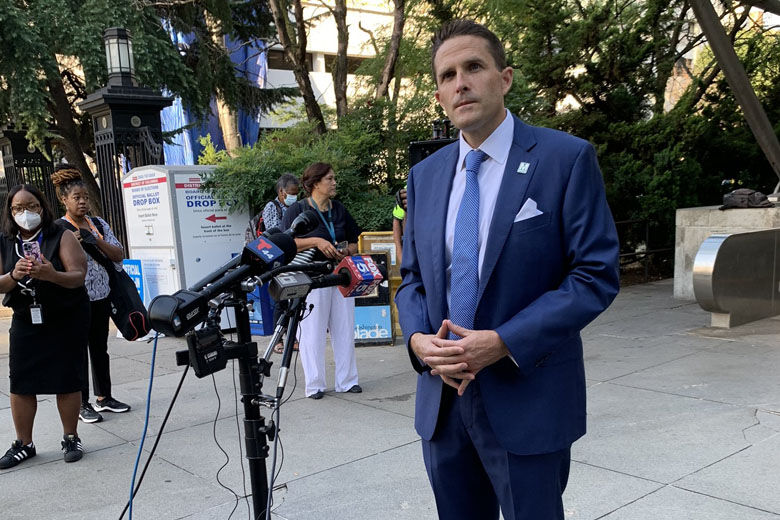This video is no longer available.
Metro’s new general manager officially started Monday, acknowledging there are plenty of issues to tackle on Day One.
“Are there things to improve? Of course — and there will never be a day where I don’t think that we can continually improve,” Randy Clarke said to reporters gathered outside the Foggy Bottom Metro station.
Clarke started his first day speaking with reporters, followed by a ride on the rails where he greeted Metro employees and chatted with customers.

The new general manager seemed optimistic about Metro’s future — even amid a stack of challenges, including safety issues related to its 7000 series rail cars. Even with those issues, Clarke expressed confidence in Metrorail, and said he and his wife will be regular customers.
“I believe this is a safe system. Clearly, though, we need to get higher frequency, more reliability. We need to get our customers back, and I’m going to be the customers’ champion because I’m a customer, too,” Clarke said.
The agency is also dealing with the need to lure riders back after a pandemic-related drop in customers as well as boosting service frequency.
“We can’t get our frequency back until 7Ks are rolling. So there’s no question about that,” Clarke said. “We’re going to see how we can work with our partners at the WMSC (Washington Metrorail Safety Commission) to move that process along,” he said.
The 7000 series cars make up 60% of Metro’s total fleet and were pulled from the tracks last fall after a derailment, leading to significantly slower service across all lines for the past several months. A plan to bring a limited number of 7000 series railcars back — which requires Metro following daily inspections of the rail cars’ wheelsets — has hit a few snags.
The rails were a hot topic, but Clarke didn’t leave Metrobus out of the discussion.
“Obviously, the bus system is critical to the backbone of this community,” he said. “And we’ve got to make sure that we have proper staffing levels to meet today’s service and the future service.”
Metro ridership has been hit hard during the pandemic. Ridership numbers released in the spring showed modest growth in the rise of daily riders compared with the early days of the pandemic. But rail ridership remained at just 32% of pre-pandemic weekday levels, compared with 65% of bus ridership.
“There’s also a lot other regular things that you hear people talk about, whether it’s public safety concerns, to fares, to cleanliness,” Clarke said.
“We’ve got to be attacking all of these elements, because it’s about the customer. And if we can get that right, I think, then we can start the larger conversation about our budget and long-term business model and how the region kind of comes together,” he added.
“But crawl, walk, run — we’ve got to get the service back to a reliable frequent level that everyone can rely on and be really proud of in the region.”
Clarke’s hiring was first announced in May. His predecessor, Paul Wiedefeld, joined Metro in 2016 and was largely credited with making improvements early on but also faced questions over the handling of the problems with the 7000-series trains.
Wiedefeld retired in May — a month earlier than planned — following the announcement that hundreds of Metro operators had lapsed safety re-certifications.
WTOP’s Jack Moore contributed to this report.







